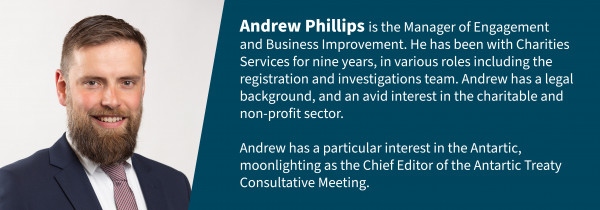Being flexible with your rules
blogs
Updated 10 December 2021
[![]() 3 minutes to read]
3 minutes to read]

The various measures taken to prevent the spread of COVID-19 have meant a lot of charities need to think about how they meet and make decisions. For some charities this has meant having Annual General Meetings (AGM) over video conferencing software like Zoom. For others, this has meant making official decisions over email rather than in person meetings.
Planning for events like this is an important part of good governance. Make sure your rules give you the flexibility to meet and make decisions remotely where it’s not possible or safe to meet in person. Check out our website for more information on rules, what they are and why you need them.
Can we meet and make decisions remotely?
The first thing to do is to look at your rules document on the Charities Register. This should have the most up to date copy of your rules. You should also regularly check with your fellow board members to see if your rules have been changed and need to be updated on the Register.
If your rules give you broad powers to carry out meetings as you see fit, you don’t need to mention online meetings specifically. If your rules explicitly explain how you have meetings and make decisions, but don’t allow for remote meetings, then you’ll need to change your rules.
How can I change my rules?
Your rules document will usually have an amendment clause that explains how you can make changes to your rules. If you don’t already have this clause in your rules, we recommend you talk to a lawyer about getting one added.
The Government has made it easier for incorporated societies, incorporated trust boards, companies, and certain Māori entities to make changes to their rules in response to the challenges posed by COVID-19. You can find out how to make temporary changes to constitutions or rules, how your charity can make use of electronic means and what exemptions from compliance obligations have been put in place. These provisions are temporary and end on 30 April 2022 (unless they are extended).
Suggested clauses
We recommend having conversations with your committee, stakeholders, and members to work out what works best for your group. We also recommend wording your rules so it’s as easy as possible for you to make decisions based on the situation. Think about what might come up that could disrupt meetings – natural disasters, pandemics, life events – and make sure your rules allow you to be flexible in each of those situations
Here are some suggested clauses (borrowed from the Constitution Builder – a great tool to create rules if you are an Incorporated Society):
“The Annual General Meeting and/or Special General Meeting may be held at one or more venues using any real-time audio, audio and visual, or electronic communication that gives each member a reasonable opportunity to participate.”
“The Committee/Board shall meet [at least monthly/at least quarterly/as required] at such times and places and in such manner (including by audio, audio and visual, or electronic communication) as it may determine and otherwise where and as convened by the Chair/President or Secretary.”
“Decisions of the Committee/Board may be made in such manner (including by audio, audio and visual, or electronic communication) as it determines.”
Where to go for more information
We do recommend seeking legal advice if your rules aren’t clear. Some Community Law Centres provide support to charities.
There are also some helpful resources available to help you with rules changes:
CommunityNet Aotearoa has more information on trust deeds and trust deed variations.
MBIE has guidance on changing rules for incorporated trusts on their website.
If you do make changes, remember you need to make any changes to the Charities Register within 3 months. We recommend uploading a copy of your rules that incorporates any changes, so your members, stakeholders, and the public can easily understand your current rules.
Thank you to Steven Moe of Parry Field Lawyers, and Mark Dadelszen of Not-for-Profit Law for their helpful comments on this blog.

